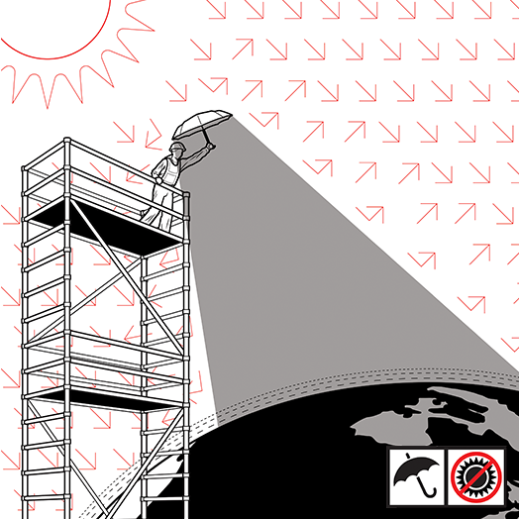Via MIT Technology Review
-----

Illustration by McKibillo
More than a decade ago, Paul Crutzen, who won the 1995 Nobel Prize in chemistry for his research on the destruction of stratospheric ozone, popularized the term “Anthropocene” for Earth’s current geologic state. One of the more radical extensions of his idea—that human activity now dominates the planet’s forests, oceans, freshwater networks, and ecosystems—is the controversial concept of geoengineering, deliberately tinkering with the climate to counteract global warming. The logic is straightforward: if humans control the fate of natural systems, shouldn’t we use our technology to help save them from the risks of climate change, given that there’s little hope of cutting emissions enough to stop the warming trend?
In recent years a number of scientists—including Crutzen himself in 2006—have called for preliminary research into geoengineering techniques such as using sulfur particles to reflect some of the sun’s light back into space. With the publication of A Case for Climate Engineering, David Keith, a Harvard physicist and energy policy expert, goes one step further. He lays out arguments—albeit hedged with caveats—for actually deploying geoengineering. He says that releasing sun-blocking aerosol particles in the stratosphere (see “A Cheap and Easy Plan to Stop Global Warming,” March/April 2013) “is doable in the narrow technocratic sense.”
Indeed, Keith is steadfastly confident about the technical details. He says a program to cool the planet with sulfate aerosols—solar geoengineering—could probably begin by 2020, using a small fleet of planes flying regular aerosol-spraying missions at high altitudes. Since sunlight drives precipitation, could reducing it lead to droughts? Not if geoengineering was used sparingly, he concludes.
Australian ethicist Clive Hamilton calls the book “chilling” in its technocratic confidence. But Keith and Hamilton do agree on one thing: solar geoengineering could be a major geopolitical issue in the 21st century, akin to nuclear weapons during the 20th—and the politics could, if anything, be even trickier and less predictable. The reason is that compared with acquiring nuclear weapons, the technology is relatively easy to deploy. “Almost any nation could afford to alter the Earth’s climate,” Keith writes. That fact, he says, “may accelerate the shifting balance of global power, raising security concerns that could, in the worst case, lead to war.”
Thing reviewed
A Case for Climate Engineering
David Keith MIT Press, 2013
The potential sources of conflict are myriad. Who will control Earth’s thermostat? What if one country blames geoengineering for famine-inducing droughts or devastating hurricanes? No treaties ban climate engineering explicitly. And it’s not clear how such a treaty would operate.
Keith professes ambivalence about whether humans are truly able to wield such powerful technology wisely. Yet he feels that the more information scientists uncover about the risks of geoengineering, the lower the chances the technology will be used recklessly. Though his book leaves unanswered many of the questions that arise over how to govern geoengineering, a policy paper that he published in Science last year goes further to address them: he and a coauthor proposed government authority over research and a moratorium on large-scale geoengineering but said there should be no treaties regulating small-scale experiments.
Hamilton says this approach would lead nations on a path toward the conflict that he thinks would inevitably surround geoengineering. Allowing lightly regulated small experiments, he suggests, could undermine the urgency of political efforts toward cutting emissions. This, in turn, increases the possibility that geoengineering will be used, since failing to restrain emissions will leave temperatures rising. Hamilton accuses Keith of seeking a “naïve … cocoon of scientific neutrality” and says researchers cannot “absolve themselves of responsibility for how their schemes might be used or misused in the future.”
That may be true, but Keith deserves credit for directing attention to ideas he knows are dangerous. Accepting the concept of the Anthropocene means accepting that humans have the responsibility to find technological fixes for disasters they have created. But little progress has been made toward a process for rationally supervising such activity on a global scale. We need a more open discussion about a seemingly outlandish but real geopolitical risk: war over climate engineering.
Personal comment:
"Who will control Earth’s thermostat?" Oh well, following yesterday's news, I would suggest Google, they have "smart" technology ...
By the way, will we also reach some "climate neutrality quash" one day (compared to "net neutrality quashed" by a federal court), once global weather will definitely be an artifact and a product?

